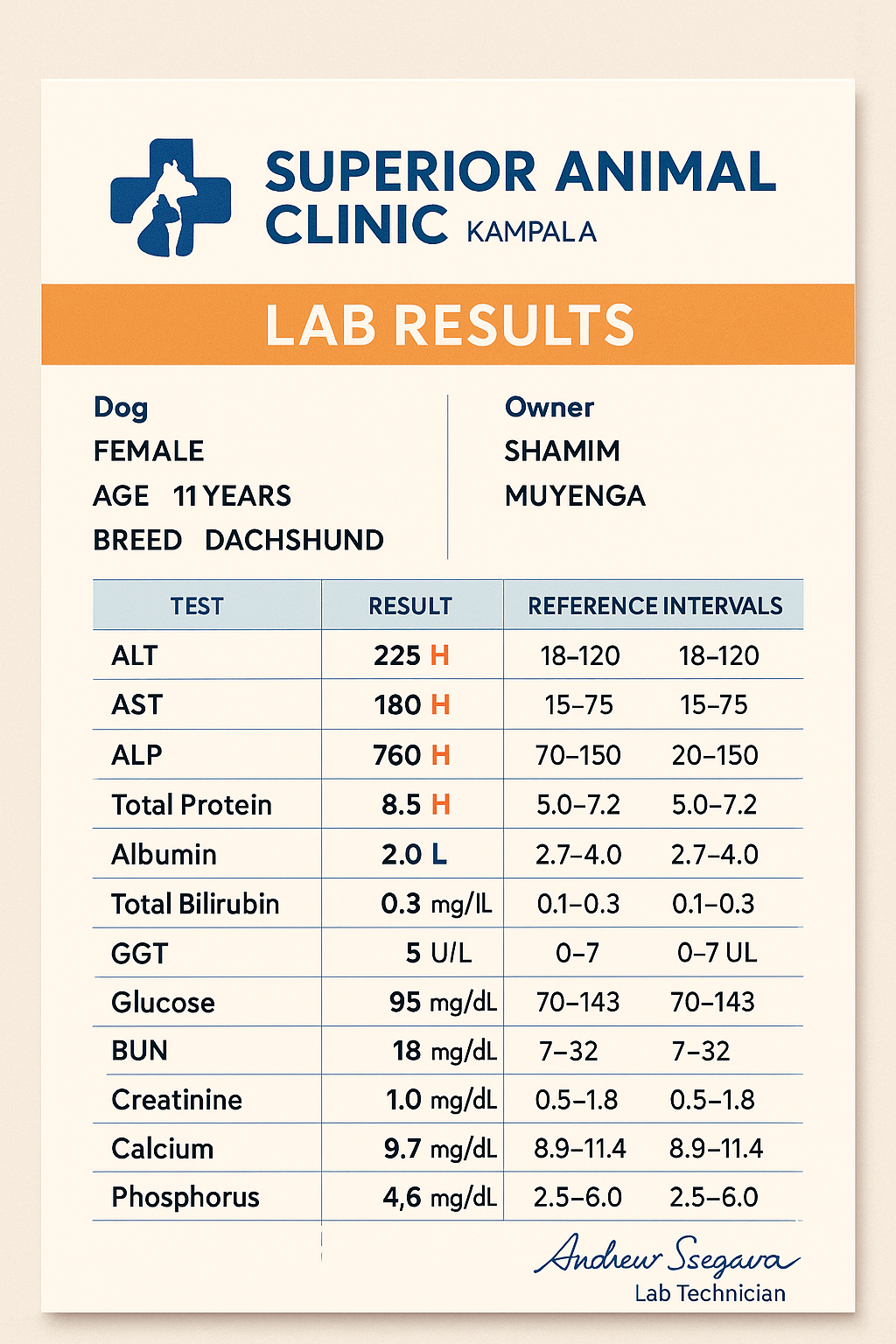
Has your dog been unusually tired, refusing food, vomiting, or developing yellow eyes or gums? You’re not alone — many caring dog owners across Kampala, Uganda notice these worrying signs and start searching online for “best vet for liver disease in dogs near me”, “dog vomiting yellow eyes treatment Kampala”, or “affordable veterinary clinic for liver problems in dogs.”
At Superior Animal Clinic, located in Makindye along Salaama Road, we see these cases every week — and the good news is that liver disease in dogs can be treated and managed successfully when caught early. The liver is one of your dog’s most vital organs, responsible for detoxifying the body, digesting food, and maintaining overall health. When it fails, the effects can be devastating — but with the right care, your dog can fully recover.
Whether you live in Ntinda, Muyenga, Rubaga, Nsambya, Katwe, Buziga, Munyonyo, Nakawa, Lubowa, or Kololo, our team of experienced veterinarians at Superior Animal Clinic is ready to help. We combine modern diagnostics, compassionate care, and proven treatment methods to restore your pet’s health and happiness.
Let’s explore everything you need to know about liver disease in dogs — its causes, symptoms, treatment, prevention, and why Superior Animal Clinic is the #1 trusted veterinary clinic for dogs with liver disease in and around Kampala.
🩺 Understanding Liver Disease in Dogs
The liver is one of the most important organs in your dog’s body — it helps detoxify the blood, store energy, digest food, and process nutrients.
When the liver becomes damaged, these vital functions slow down or stop, leading to serious health problems.
At Superior Animal Clinic, we frequently treat liver conditions such as:
- Hepatitis (liver inflammation) – often caused by infections, toxins, or immune diseases.
- Liver cirrhosis – long-term damage leading to scarring and poor function.
- Liver cancer or tumors – common in older dogs.
- Fatty liver disease – caused by obesity, poor diet, or lack of exercise.
- Toxin-induced liver failure – from poisonous plants, spoiled food, or certain drugs.
🐶 Symptoms of Liver Disease Among Dogs in Uganda
Liver disease in dogs can be tricky — many signs start small and are easy to miss until the condition becomes serious. At Superior Animal Clinic in Makindye, Kampala, we’ve seen that most dog owners in Uganda only notice liver problems when their dogs start showing visible changes in appetite, energy, or appearance.
Here are the most common symptoms of liver disease in dogs you should watch for:
1. Loss of Appetite and Weight Loss
Dogs with liver disease often stop eating or eat less than usual. You may notice your dog turning away from food or losing weight even when eating normally. This happens because the liver is struggling to process nutrients.
2. Vomiting and Diarrhea
Frequent vomiting or soft stool with a yellowish or pale color are warning signs. In some Kampala neighborhoods where dogs eat leftovers or contaminated food, such as Katwe, Nsambya, and Kasubi, these signs are particularly common.
3. Yellowing of Eyes, Gums, and Ears (Jaundice)
A clear sign of liver problems is when your dog’s eyes, gums, or inside of the ears turn yellow. This is due to a buildup of bilirubin in the blood — a major red flag that your dog’s liver is failing to filter toxins properly.
4. Swollen Abdomen (Ascites)
A bloated belly is often caused by fluid buildup due to liver failure. Many pet owners in areas like Makindye, Muyenga, and Lubowa come to us after noticing their dog’s abdomen swelling for days.
5. Lethargy and Weakness
Dogs with liver disease often seem tired, weak, or less playful. They may sleep more, walk slowly, or lose interest in favorite activities.
6. Increased Thirst and Urination
When the liver struggles, the body tries to compensate — dogs may drink more water and urinate frequently. This can be confused with kidney disease, so it’s best to get your dog examined by our vets at Superior Animal Clinic.
7. Behavioral Changes
Some dogs become unusually aggressive, confused, or disoriented due to a condition called hepatic encephalopathy, where toxins affect the brain because the liver can’t remove them.
8. Bad Breath and Pale Gums
A foul, musty odor from your dog’s mouth, combined with pale or grayish gums, can indicate poor liver function.
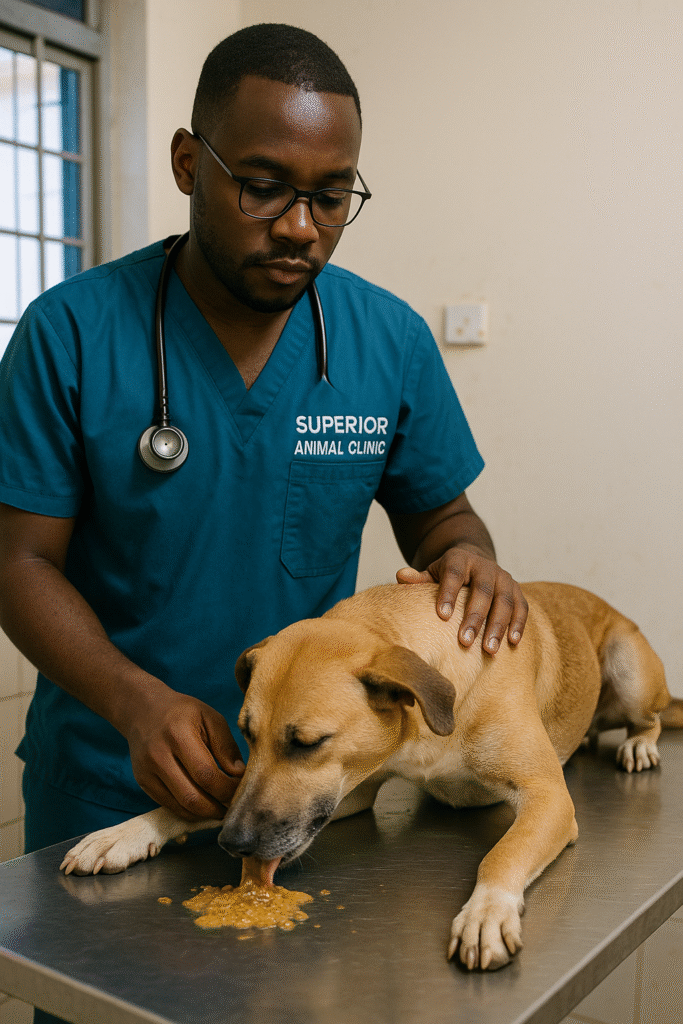
⚠️ When to See a Vet
If your dog shows two or more of these symptoms, don’t wait. Liver disease can worsen fast if not treated.
At Superior Animal Clinic, we provide comprehensive diagnostic tests, including blood analysis, ultrasound, and liver function tests, to detect the exact cause early and begin the right treatment.
🐶 Common Causes of Liver Disease in Dogs in Uganda
Liver disease in dogs doesn’t just appear overnight — it usually develops slowly due to different factors that affect the liver’s ability to function properly. In Uganda, especially around Kampala, several everyday things can lead to liver problems in dogs.
Let’s look at the most common causes we see at Superior Animal Clinic in Makindye:
🦠 1. Infections (Bacterial and Viral Diseases)
One of the leading causes of liver disease among dogs in Uganda is infection.
- Leptospirosis, a bacterial infection spread through contaminated water or rodent urine, is common in many areas of Kampala, especially where drainage systems are poor.
- Canine Infectious Hepatitis (Adenovirus type 1) is another major cause, especially in unvaccinated dogs.
These infections damage the liver cells directly and can cause fever, vomiting, jaundice (yellow gums and eyes), and even death if untreated.
Tip: Regular vaccinations and clean drinking water help prevent infection-related liver disease.
☣️ 2. Toxin Exposure
Dogs are naturally curious — they lick, chew, and explore everything around them. Unfortunately, many common household items and environmental substances in Uganda can harm their liver.
Some common toxins include:
- Pesticides and insecticides used around homes and gardens.
- Spoiled or moldy food, especially from garbage and aflatoxins
- Medications meant for humans, such as paracetamol or ibuprofen.
- Herbal mixtures and traditional remedies given without veterinary advice.
- Contaminated borehole water or stagnant rainwater in areas like Katwe, Kasubi, and Ndejje.
These substances can poison the liver and cause serious, sometimes irreversible damage.
🧬 3. Genetic or Inherited Conditions
Certain breeds of dogs in Uganda are more prone to liver disease due to inherited metabolic issues.
At Superior Animal Clinic, we frequently diagnose liver disorders in breeds like:
- Doberman Pinschers (prone to chronic hepatitis)
- Cocker Spaniels (genetic copper accumulation in the liver)
- Labrador Retrievers (obesity-related liver problems)
If you own one of these breeds, regular checkups are essential to catch liver problems early.
4. Poor Nutrition and Obesity
Feeding your dog fatty, salty, or leftover human food can overwork and damage the liver.
In neighborhoods like Muyenga, Munyonyo, and Bugolobi, where many dogs are indoor pets, obesity and poor diet are common causes of liver issues.
On the other hand, stray and underfed dogs in areas like Katwe, Kasubi, and Old Kampala often develop fatty liver disease due to malnutrition and nutrient deficiencies.
Healthy feeding tip: Always provide a balanced, vet-approved diet with clean water and avoid table scraps.
5. Drug or Chemical Reactions
Certain medications, even veterinary drugs, can affect the liver if given for a long time or in incorrect doses.
Painkillers, antibiotics, and deworming tablets should only be given under a vet’s guidance.
At Superior Animal Clinic, we adjust medication plans to protect your dog’s liver during treatment.
6. Age-Related Liver Decline
Older dogs are more likely to develop liver disease because the liver becomes less efficient with age.
We often see this in dogs above 8 years, especially in large breeds. Regular senior checkups at Superior Animal Clinic help detect early liver changes before they cause severe illness.
7. Environmental Factors
In Kampala, environmental conditions also play a major role:
- Dogs exposed to polluted water or waste dumps (common in Kasubi, Katwe, and Ndejje) have a higher risk of infections and toxin ingestion.
- In urban estates like Ntinda, Lubowa, and Naguru, chemical exposure from lawn care and cleaning agents is common.
- In rural outskirts like Mityana, consumption of herbal plants or spoiled feeds can trigger liver inflammation.
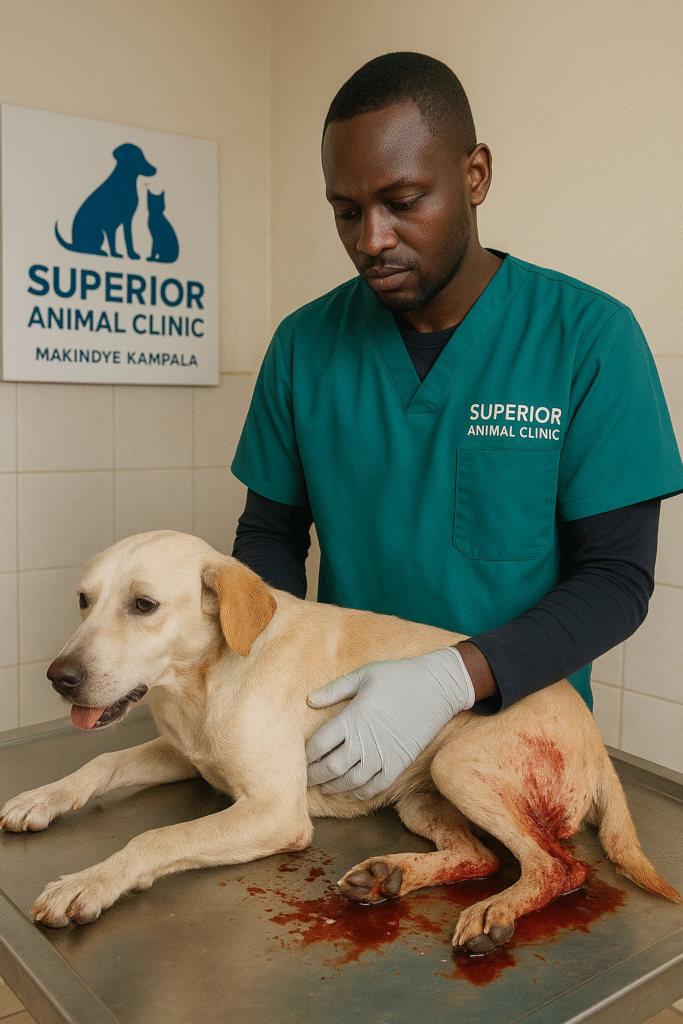
❤️ In Summary
Liver disease in dogs can result from a combination of infections, toxins, diet, age, and genetics.
But the good news is that most causes are preventable.
With regular vet checkups, vaccinations, safe feeding habits, and timely treatment, your dog can live a long, healthy life.
At Superior Animal Clinic in Makindye, Kampala, we don’t just treat liver disease — we help you prevent it through education, routine screenings, and safe nutrition plans tailored for your dog’s needs.
🐕 Dog Breeds in Uganda More Prone to Liver Disease and Why
While any dog can develop liver disease, some breeds in Uganda are naturally more predisposed to it because of genetics, lifestyle, and diet. At Superior Animal Clinic in Makindye, Kampala, we often see certain breeds brought in for liver-related issues more frequently than others.
Here’s a breakdown of the most commonly affected breeds and the reasons behind their higher risk:
🟤 1. Labrador Retrievers
Labradors are among the most popular dogs in Kampala — loved for their friendliness and intelligence. However, they are prone to obesity, especially when overfed or not exercised enough.
Why they’re at risk:
- Excess body fat puts strain on the liver.
- They’re prone to fatty liver disease (hepatic lipidosis).
- Many Labradors also have a genetic tendency to store more fat in the liver.
At Superior Animal Clinic, we often see overweight Labradors from areas like Muyenga, Munyonyo, Lubowa, and Ntinda, where dogs are commonly kept indoors and fed human food.
🟠 2. Doberman Pinschers
Dobermans are beautiful and loyal dogs, but they have a genetic predisposition to a condition called chronic active hepatitis, which can progress to liver failure if not diagnosed early.
Why they’re at risk:
- They inherit abnormal immune responses that attack their own liver cells.
- Female Dobermans seem more affected than males.
Regular liver enzyme blood tests at Superior Animal Clinic help detect this condition before it becomes severe.
🟣 3. German Shepherds
German Shepherds are strong working dogs, but they are very sensitive to toxins and certain medications that can damage the liver.
Why they’re at risk:
- Exposure to household or environmental chemicals (common in compounds around Kampala).
- High metabolic rate makes them more vulnerable to drug-induced liver injury.
We often see German Shepherds from Nakasero, Kololo, and Makindye brought in after exposure to toxic substances or contaminated foods.
🟢 4. Cocker Spaniels
Cocker Spaniels are gentle and affectionate, but they’re known for immune-mediated hepatitis — a condition where their immune system mistakenly attacks liver tissue.
Why they’re at risk:
- Genetic sensitivity to immune system overactivity.
- Prone to chronic liver inflammation if untreated.
Owners in Rubaga, Muyenga, and Buziga often bring their Cocker Spaniels to Superior Animal Clinic for recurrent digestive or jaundice-like symptoms linked to liver inflammation.
🔵 5. Terriers (especially Yorkshire and Cairn Terriers)
Small breed Terriers are prone to congenital liver shunts, where blood bypasses the liver, preventing proper detoxification.
Why they’re at risk:
- Born with abnormal liver blood vessels (portosystemic shunts).
- Can develop neurological symptoms, poor growth, and vomiting early in life.
Our vets at Superior Animal Clinic use ultrasound and blood ammonia testing to confirm and manage this condition effectively.
⚫ 6. Mixed-Breed and Local Dogs
Many local and mixed-breed dogs in Uganda, especially those rescued from the streets or rural areas, suffer liver damage from poor diet and toxin exposure.
Why they’re at risk:
- Scavenging contaminated food and garbage.
- Drinking dirty or stagnant water.
- Infections like leptospirosis from contaminated environments.
We frequently treat such cases from Katwe, Kasubi, Nsambya, and Old Kampala, where outdoor dogs are more likely to come into contact with bacteria, waste, and spoiled food.
🟡 7. Toy Breeds (Poodles, Chihuahuas, Maltese)
Small dogs have tiny livers that can easily become overwhelmed by toxins, fatty diets, or infections.
Why they’re at risk:
- Overfeeding or giving human food quickly strains their liver.
- They’re more sensitive to drug doses meant for larger dogs.
Our team at Superior Animal Clinic carefully tailors medication doses for smaller dogs to avoid accidental liver stress.
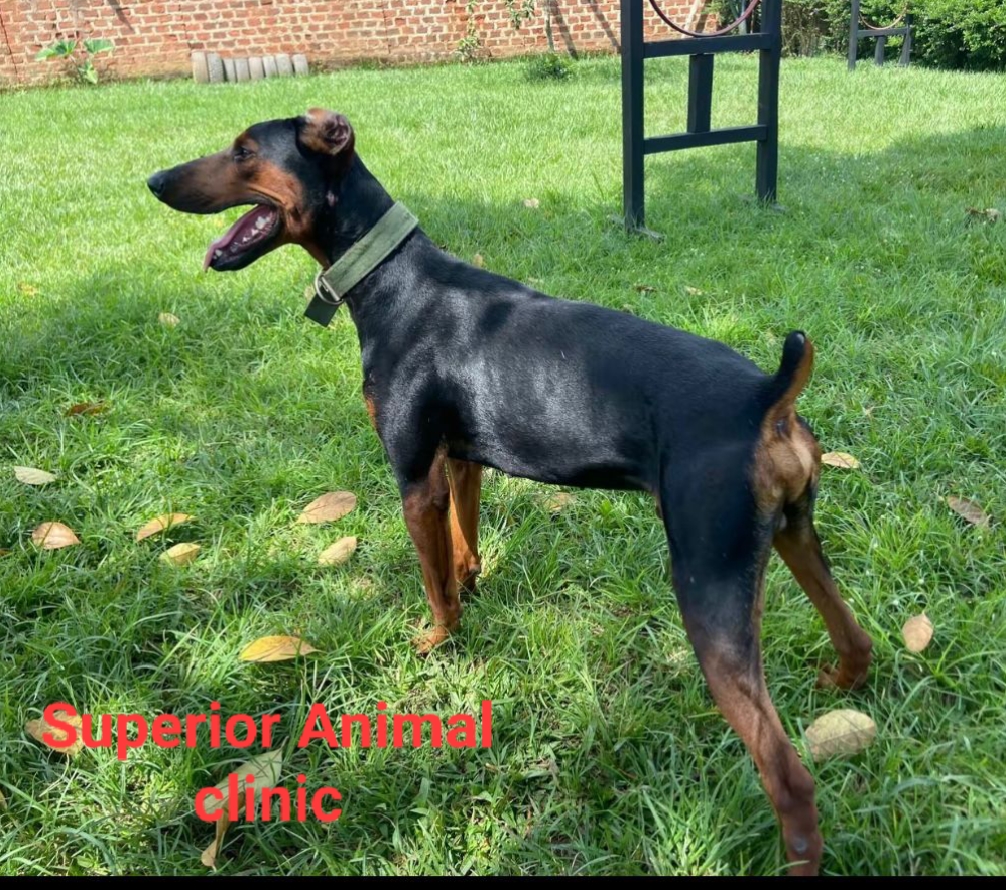
💡 Key Takeaway for Dog Owners in Kampala
No matter the breed, your dog’s diet, environment, and regular vet checkups play a big role in keeping their liver healthy. If your dog is one of the breeds listed above, or if you notice signs like vomiting, loss of appetite, yellow eyes, or tiredness, it’s time to visit Superior Animal Clinic for a full liver health screening.
⚕️ How We Diagnose Liver Disease at Superior Animal Clinic
When you bring your dog to Superior Animal Clinic in Makindye, our vets perform a full clinical examination followed by:
- Blood tests to check liver enzymes (ALT, AST, ALP).
- Urine analysis to assess toxins and bile pigment.
- Ultrasound or X-ray to visualize liver size and texture.
- Liver biopsy (if needed) to confirm the diagnosis.
Our advanced diagnostic tools help us detect even early stages of liver disease before it becomes severe.
🩺 Treatment of Liver Disease in Dogs in Uganda at Superior Animal Clinic
When it comes to treating liver disease in dogs, the approach must be careful, personalized, and backed by proper diagnosis. At Superior Animal Clinic in Makindye, along Salaama Road, Kampala, we don’t just treat symptoms — we identify the root cause of your dog’s liver problem and provide a comprehensive treatment plan designed for full recovery.
We treat liver disease in dogs from all areas, including Ntinda, Muyenga, Nsambya, Katwe, Makindye, Lubowa, Munyonyo, Buziga, Nakawa, Rubaga, Kololo, and beyond.
Step 1: Accurate Diagnosis
Before starting treatment, our vets perform a complete liver function assessment using modern veterinary equipment available at our clinic. This includes:
- Physical examination: Checking for yellowing of gums, enlarged abdomen, and dehydration.
- Blood tests (Liver Enzymes – ALT, AST, ALP): To measure how well the liver is functioning.
- Ultrasound or X-ray: To check the liver size, texture, and detect tumors or swelling.
- Urine and stool analysis: To identify toxins or infections.
- Liver biopsy (if necessary): For chronic or unexplained cases.
These tests help us determine the type and severity of liver disease, which guides us in choosing the best treatment approach for your dog.
Step 2: Stabilization and Supportive Care
Dogs with severe liver disease often arrive weak, dehydrated, and nauseous.
At Superior Animal Clinic, we immediately provide supportive therapy to stabilize their condition:
- Intravenous (IV) fluids – to flush out toxins, correct dehydration, and balance electrolytes.
- Anti-nausea injections – to control vomiting and restore appetite.
- Pain relief medications – to ease abdominal discomfort.
- Antibiotics (if infection is suspected) – to treat bacterial causes like leptospirosis, which is common in Uganda.
We monitor your dog’s vital signs closely throughout this process to ensure a safe recovery.
Step 3: Liver-Protective Medications
Once stabilized, your dog receives specific hepatoprotective medications to repair and protect the liver:
- S-Adenosylmethionine (SAMe) – boosts liver regeneration and detoxification.
- Ursodeoxycholic Acid (Ursodiol) – improves bile flow and reduces inflammation.
- Milk Thistle (Silymarin) – a natural liver detoxifier used under veterinary guidance.
- Vitamin Supplements (B-complex, E, and K) – help restore normal metabolism and prevent further liver damage.
- Prednisolone or Corticosteroids – for immune-mediated hepatitis or inflammatory causes.
Each medication is carefully dosed based on your dog’s weight, breed, and disease stage — ensuring safety and effectiveness.
Step 4: Nutritional Management and Special Diet
Nutrition plays a major role in liver recovery.
At Superior Animal Clinic, we design custom feeding plans for dogs with liver disease:
- Low-protein, low-fat diets – to reduce liver workload.
- Easily digestible meals such as boiled chicken, rice, and pumpkin.
- Prescription diets like Royal Canin Hepatic or Hill’s Prescription Diet l/d are recommended for long-term management.
- Small, frequent meals – help maintain steady energy levels and prevent vomiting.
We also guide you on what not to feed, such as salty foods, fried meat, table scraps, and high-fat treats — all of which worsen liver damage.
Step 5: Treating the Underlying Cause
Every liver disease case has a trigger — and identifying it is key to preventing recurrence.
At Superior Animal Clinic, we address the specific cause:
- Bacterial infections: Treated with antibiotics such as amoxicillin-clavulanate or doxycycline.
- Toxin ingestion: We administer activated charcoal, IV fluids, and detox agents.
- Hormonal or metabolic causes: Managed with medication and diet adjustments.
- Tumors or growths: Referred for surgery or advanced imaging.
By treating both the symptoms and the underlying problem, we give your dog the best chance for long-term recovery.
Step 6: Continuous Monitoring and Follow-up
Liver disease recovery takes time, so our vets recommend regular follow-up visits.
We recheck blood enzyme levels every few weeks and adjust medications or diet based on your dog’s progress.
For chronic cases, ongoing management ensures your pet stays comfortable and healthy for years.
🧡 Step 7: Home Care Guidance
We don’t just treat your dog at the clinic — we guide you on how to care for your pet at home:
- Keep your dog hydrated always.
- Give prescribed medications consistently.
- Follow the diet plan strictly.
- Prevent exposure to toxins, spoiled food, and human drugs.
- Watch for warning signs like vomiting, loss of appetite, or yellow gums — and report them early.
Our team at Superior Animal Clinic provides one-on-one guidance, ensuring every pet parent understands how to care for their dog during recovery.
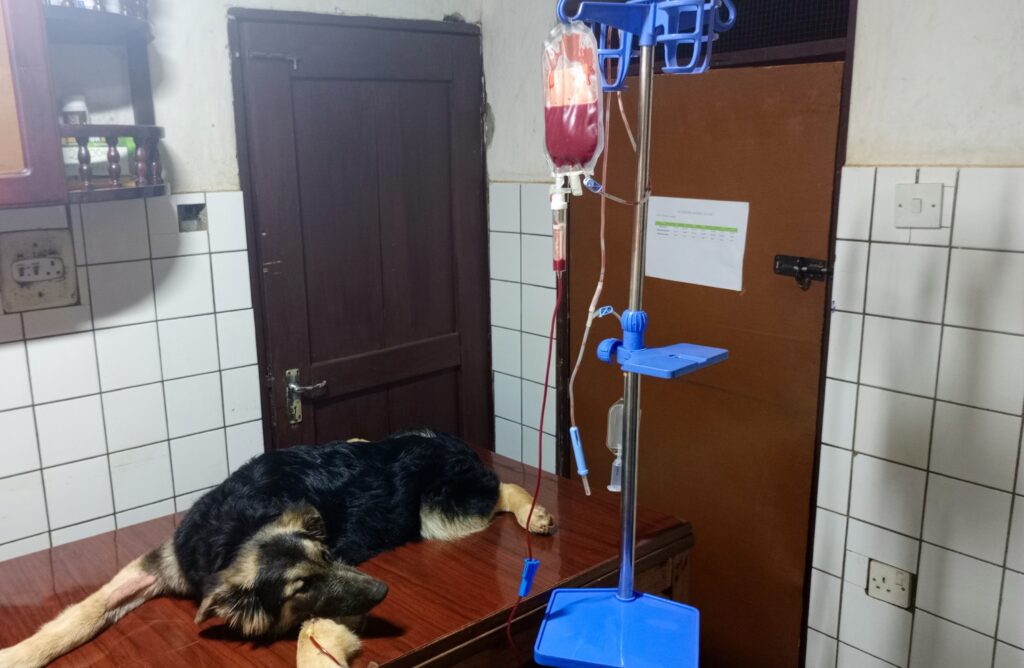
Best Foods to Feed a Dog with Liver Disease in Uganda
Feeding the right diet is one of the most important parts of helping your dog recover from liver disease. At Superior Animal Clinic in Makindye, Kampala, we’ve seen that dogs who receive the correct diet heal faster, gain back strength, and live much longer.
The liver works hard to filter toxins, digest food, and store nutrients — but when it’s damaged, the wrong foods can overload it and make your dog’s condition worse. That’s why a special liver-friendly diet is essential.
Here’s a breakdown of the best foods and feeding tips for dogs with liver disease in Uganda:
1. Easily Digestible Proteins
Dogs with liver disease still need protein, but it should be high-quality and easy to digest. Avoid red meat and fatty cuts.
Best protein options include:
- Boiled chicken breast – lean and gentle on the liver.
- Boiled fish (like Nile perch or tilapia) – light, nutritious, and easily available in Ugandan markets.
- Boiled eggs – rich in amino acids that support liver repair (serve in moderation).
👉 Tip: Avoid raw meat, as it may contain bacteria that stress the liver further.
2. Low-Fat, High-Fiber Vegetables
Vegetables provide vitamins, antioxidants, and fiber to aid digestion and detoxification.
Best vegetables for dogs with liver disease:
- Pumpkin – great for digestion and liver support.
- Carrots – rich in beta-carotene, which helps detoxify the liver.
- Green beans and peas – provide fiber and mild protein.
- Sweet potatoes – energy-rich and easy on the stomach.
👉 Steam or boil all vegetables before feeding. Avoid adding salt, onions, or spices.
3. Complex Carbohydrates for Energy
Dogs with liver problems often lose appetite and weight, so energy from carbs helps maintain strength without stressing the liver.
Good carbohydrate sources:
- Plain boiled rice – simple and gentle.
- Oatmeal or millet porridge – great for dogs needing extra calories.
- Boiled Irish potatoes – soft and easy to digest.
4. Fruits in Moderation
Fruits add natural antioxidants that help the liver recover.
Best fruits to give:
- Watermelon – hydrating and liver-friendly.
- Apples (without seeds) – mild detoxifier.
- Papaya – improves digestion.
👉 Avoid grapes and raisins — they are toxic to dogs.
🐾 5. Prescription Liver Diets (Veterinary Recommended)
At Superior Animal Clinic, our vets often recommend specialized liver diets that are scientifically balanced for liver health.
These include:
- Royal Canin Hepatic Dog Food
- Hill’s Prescription Diet l/d (Liver Care)
- VetLife Hepatic Formula
These diets are low in copper and fat, and rich in antioxidants, zinc, and vitamins — ideal for long-term liver support.
6. Plenty of Clean Water
Always ensure your dog has fresh, clean water available. Dehydration can worsen liver problems and slow recovery.
If your dog isn’t drinking enough, you can offer rice water or light chicken broth (no salt) to encourage hydration.
🚫 Foods to Avoid for Dogs with Liver Disease
Certain foods can seriously worsen liver damage, even in small amounts.
Avoid giving your dog:
- Fatty meats (beef, pork, goat meat)
- Processed dog treats
- Salty or spicy food
- Onions, garlic, or chocolate
- Alcohol or spoiled leftovers
Sample Home-Made Meal Plan for a Dog with Liver Disease
Here’s an example of a simple meal you can prepare at home in Uganda:
Morning: Boiled rice mixed with shredded boiled chicken and carrots.
Evening: Boiled fish with mashed sweet potatoes and a little pumpkin.
Snack: Small pieces of apple or papaya.
👉 Always feed small, frequent meals (3–4 times a day) instead of one large meal. This helps the liver process nutrients slowly and reduces strain.
Get Professional Liver Diet Guidance at Superior Animal Clinic
Every dog’s liver condition is different — that’s why our vets at Superior Animal Clinic in Makindye, Kampala provide personalized feeding plans based on your dog’s:
- Liver enzyme levels
- Body weight and age
- Stage of liver disease
- Any co-existing conditions (like kidney or heart disease)
We’ll guide you on the best diet, supplements, and feeding schedule to give your dog the best chance of recovery.
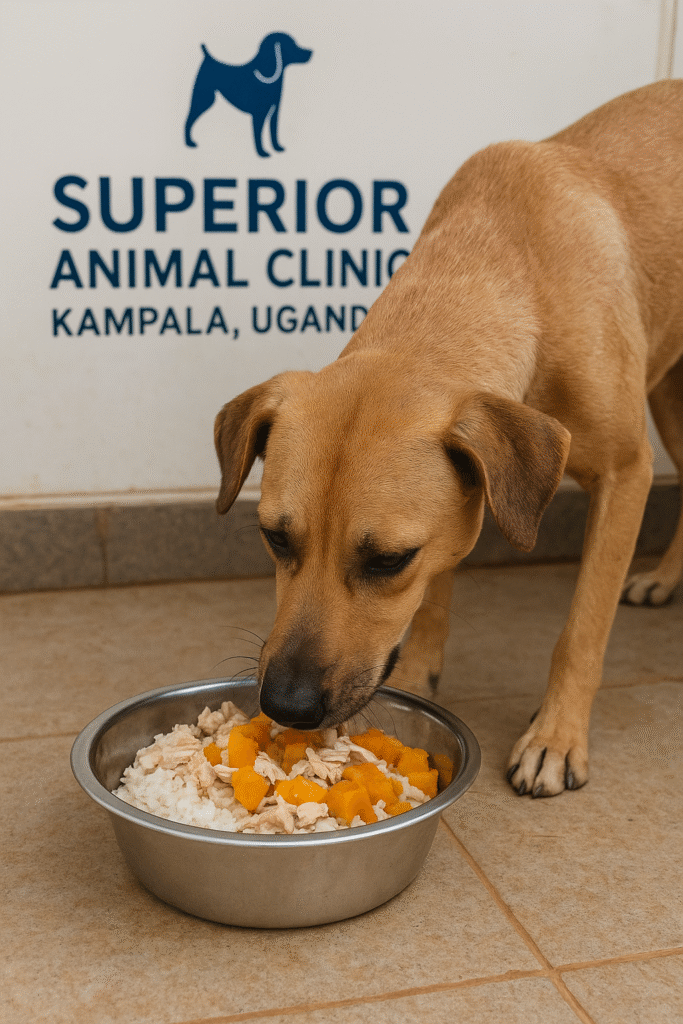
❤️ In Summary
If your dog has liver disease, food is truly medicine. The right diet can protect the liver, reduce toxins, and rebuild strength.
Your dog’s health and happiness start with what’s in their bowl — and we’re here to make sure it’s just right. 🐾
🏠 Home Remedies & Care for Dogs with Liver Disease
While vet treatment is essential, home care helps a lot:
- Keep your dog hydrated always.
- Feed small, frequent meals.
- Avoid human medications or herbs without vet approval.
- Add natural liver detox aids like milk thistle or turmeric (only as advised by your vet).
- Keep the environment toxin-free (avoid insecticides, spoiled food, and alcohol).
⚠️ Important: Home remedies should never replace veterinary treatment. Always visit a vet first — especially at Superior Animal Clinic — to confirm what’s safe for your pet.
What Happens If Liver Disease Is Not Treated
If ignored, liver disease can lead to:
- Jaundice (yellow eyes/gums)
- Vomiting and diarrhea
- Fluid buildup in the belly (ascites)
- Seizures and confusion (hepatic encephalopathy)
- Coma and death
Early diagnosis and proper treatment greatly improve survival.
🧡 Why Choose Superior Animal Clinic for Liver Disease Treatment in Dogs
- Experienced veterinarians specializing in liver disease.
- Advanced diagnostic tools (blood tests, ultrasound, and imaging).
- Affordable and compassionate care.
- 24/7 emergency support for critical dogs.
- Located conveniently in Makindye, Kampala, accessible from Ntinda, Muyenga, Munyonyo, Nakawa, Rubaga, Nsambya, Kololo, Buziga, and beyond.
- Trusted by hundreds of pet owners across Uganda for reliable veterinary care.
📍 Areas in Kampala Where Liver Disease Is Common
We often receive liver disease cases from:
- Makindye, Katwe, and Nsambya – due to food contamination and outdoor scavenging.
- Muyenga, Munyonyo, and Buziga – dogs exposed to yard chemicals and toxins.
- Kasubi, Old Kampala, and Ndejje – stray dogs and poor diet.
- Lubowa, Naguru, and Ntinda – indoor dogs with obesity-related liver disease.
❓ FAQs About Liver Disease in Dogs in Uganda
1. What are the early signs of liver disease in dogs?
Early signs include vomiting, loss of appetite, yellow eyes or gums (jaundice), excessive thirst, diarrhea, and weakness.
If you notice these symptoms, visit Superior Animal Clinic in Makindye, Kampala for immediate examination and liver testing.
2. Can liver disease in dogs be cured?
Yes — many cases of liver disease can be treated or managed successfully when detected early.
At Superior Animal Clinic, we combine liver-protective medications, fluid therapy, diet management, and supplements to help your dog recover fully.
3. What are the best foods to feed a dog with liver disease in Uganda?
Feed boiled chicken, fish, rice, pumpkin, carrots, and sweet potatoes.
Avoid fatty meats, salty foods, and processed treats.
Our vets at Superior Animal Clinic Makindye can create a personalized liver diet plan for your dog based on test results.
4. How much does liver disease treatment cost in Kampala?
The cost of treating liver disease in dogs in Uganda depends on the cause and stage.
At Superior Animal Clinic, we offer affordable diagnostic tests and customized treatment packages, ensuring your dog gets the best care within your budget. Ranging from UGX 125000 to 450,000.
5. Which dog breeds are most prone to liver disease in Uganda?
Commonly affected breeds include Labrador Retrievers, Dobermans, German Shepherds, Cocker Spaniels, and Terriers.
Mixed-breed dogs that scavenge outdoors are also at high risk due to toxin exposure.
6. Can home remedies help treat liver disease in dogs?
Home remedies can support recovery but should never replace veterinary care.
Natural aids like milk thistle, turmeric, or pumpkin may help detoxify the liver — but only under veterinary guidance from Superior Animal Clinic.
7. What causes liver disease in dogs in Uganda?
In Kampala, liver disease is commonly caused by infections (like leptospirosis), toxins, spoiled food, poor diet, obesity, or long-term drug use.
Environmental toxins in areas like Katwe, Nsambya, Makindye, and Kasubi also contribute to high liver disease rates.
8. How can I prevent liver disease in my dog?
✅ Feed a balanced diet
✅ Avoid toxins and spoiled food
✅ Keep vaccinations up to date
✅ Visit Superior Animal Clinic for regular check-ups and liver screening at least once a year.
Prevention is always easier — and cheaper — than treatment.
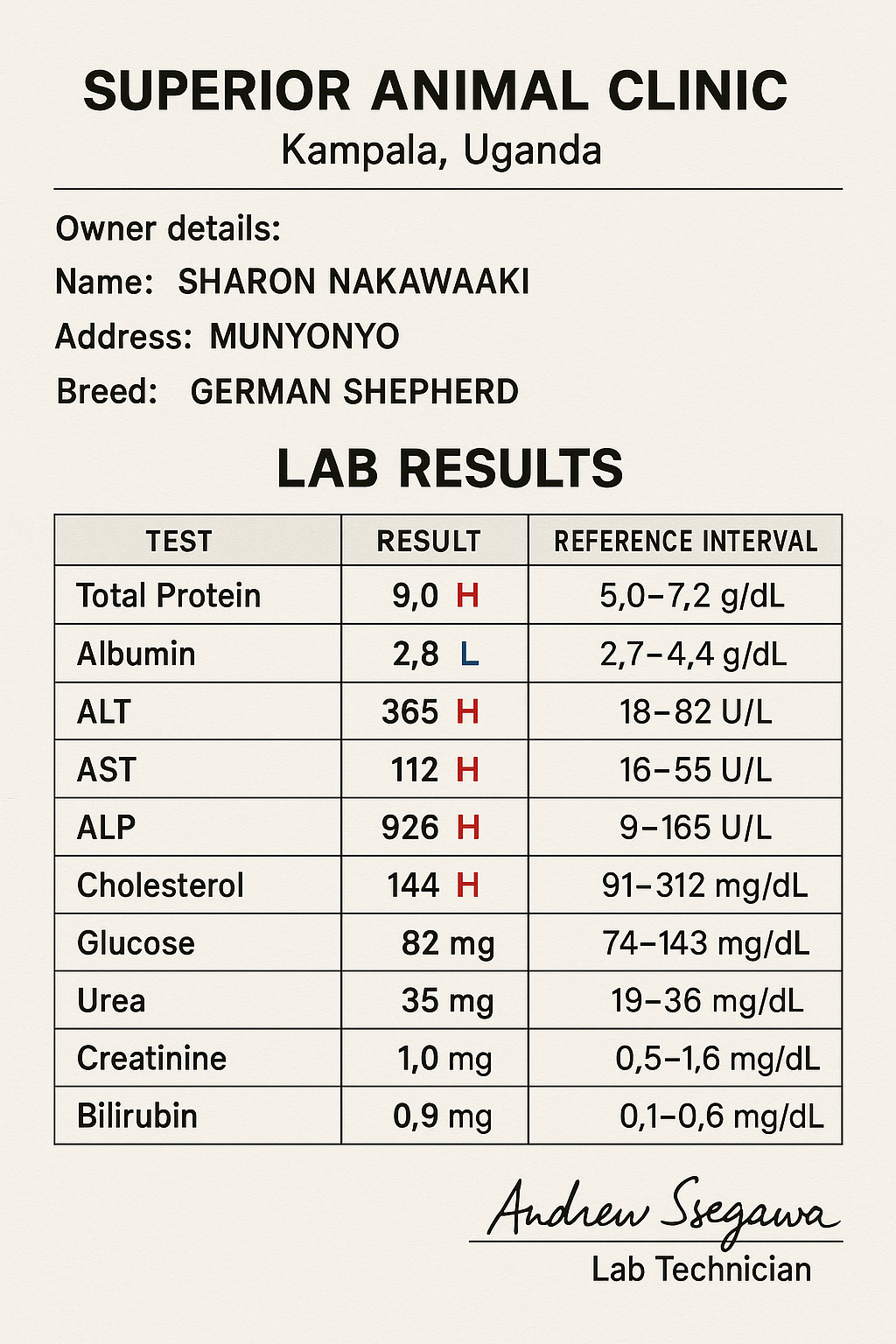
9. What happens if I don’t treat my dog’s liver disease?
Untreated liver disease can lead to fluid buildup in the abdomen (ascites), seizures, confusion, or even death.
If your dog shows yellow eyes, vomiting, or extreme fatigue, seek urgent help at Superior Animal Clinic in Makindye, Kampala.
10. Can dogs live a normal life after liver disease?
Yes — many dogs live healthy, happy lives after treatment.
With the right diet, medication, and regular follow-ups at Superior Animal Clinic, your dog’s liver can regenerate and function normally again.
11. Where can I find the best vet for liver disease in dogs near me?
If you’re in Ntinda, Muyenga, Munyonyo, Lubowa, Kololo, Ndejje, or Rubaga, the best vet near you is Superior Animal Clinic in Makindye along Salaama Road — trusted for expert liver disease diagnosis, treatment, and nutritional care.
12. What tests are done to diagnose liver disease in dogs?
Our vets perform blood tests, ultrasound, urine analysis, and sometimes liver biopsy to confirm the condition.
All these services are available at Superior Animal Clinic’s modern diagnostic center in Makindye.
13. What medications are used to treat liver disease in dogs in Uganda?
We commonly prescribe SAMe, Ursodeoxycholic acid, antibiotics (for infections), corticosteroids, and vitamin supplements.
These medications help protect the liver, fight infections, and promote regeneration.
14. Is liver disease in dogs contagious?
Most forms are not contagious, but infections like leptospirosis can spread through urine or contaminated water.
We recommend vaccination and hygiene control — services offered at Superior Animal Clinic.
15. What’s the best supplement for dogs with liver problems in Uganda?
Our vets often recommend hepatoprotective supplements like Denamarin, milk thistle extract, or zinc-based antioxidants.
These are available at Superior Animal Clinic’s pharmacy in Makindye.
16. What are the symptoms of advanced liver failure in dogs?
Severe signs include swollen abdomen, confusion, seizures, bleeding gums, dark urine, and weight loss.
If your dog has these, rush to Superior Animal Clinic for emergency treatment.
17. Are older dogs more prone to liver disease?
Yes — aging dogs have slower metabolism and weaker liver function.
Regular checkups at Superior Animal Clinic can help detect early liver changes and prevent complications.
18. Can toxins or household chemicals cause liver disease in dogs?
Absolutely. Insecticides, cleaning agents, paint, spoiled food, and certain medications can damage the liver.
Keep such items out of reach and consult Superior Animal Clinic if you suspect poisoning.
19. Is fatty liver disease common among dogs in Kampala?
Yes, especially in indoor and overweight dogs in areas like Muyenga, Bugolobi, and Lubowa.
Obesity and lack of exercise are major causes, so proper feeding and regular walks are key.
20. Can a liver-friendly diet reverse liver damage in dogs?
In mild and moderate cases — yes!
A balanced liver diet designed at Superior Animal Clinic can help repair cells, reduce inflammation, and restore liver function.
21. Do I need to bring my dog to the vet for regular liver monitoring?
Yes. Dogs recovering from liver disease should be reviewed every 3–6 months for blood tests and dietary adjustments.
Our team at Superior Animal Clinic Makindye offers affordable follow-up plans for continuous monitoring.
22. Which neighborhoods in Kampala report the most liver disease cases in dogs?
Our records show more cases in Makindye, Nsambya, Katwe, Kasubi, Rubaga, Munyonyo, and Ntinda, mainly due to diet, toxins, and poor feeding practices.
23. What’s the survival rate for dogs with liver disease in Uganda?
With timely diagnosis and proper care at Superior Animal Clinic, survival rates are high — over 80% for mild to moderate cases.
24. Does Superior Animal Clinic offer emergency treatment for dogs with liver failure?
✅ Yes — we provide 24/7 emergency care for liver disease, poisoning, and critical cases.
You can reach us anytime or visit our clinic in Makindye along Salaama Road.
25. Can vaccination prevent liver infections in dogs?
Yes. Vaccines against leptospirosis and hepatitis can prevent some liver-related infections.
Bring your dog to Superior Animal Clinic for up-to-date vaccinations and yearly checkups.
26. Is liver disease common in Ugandan dogs?
Yes — it’s one of the top five internal diseases we treat at Superior Animal Clinic.
The combination of toxins, infections, and poor diet in Uganda makes it common, especially among unmonitored dogs.
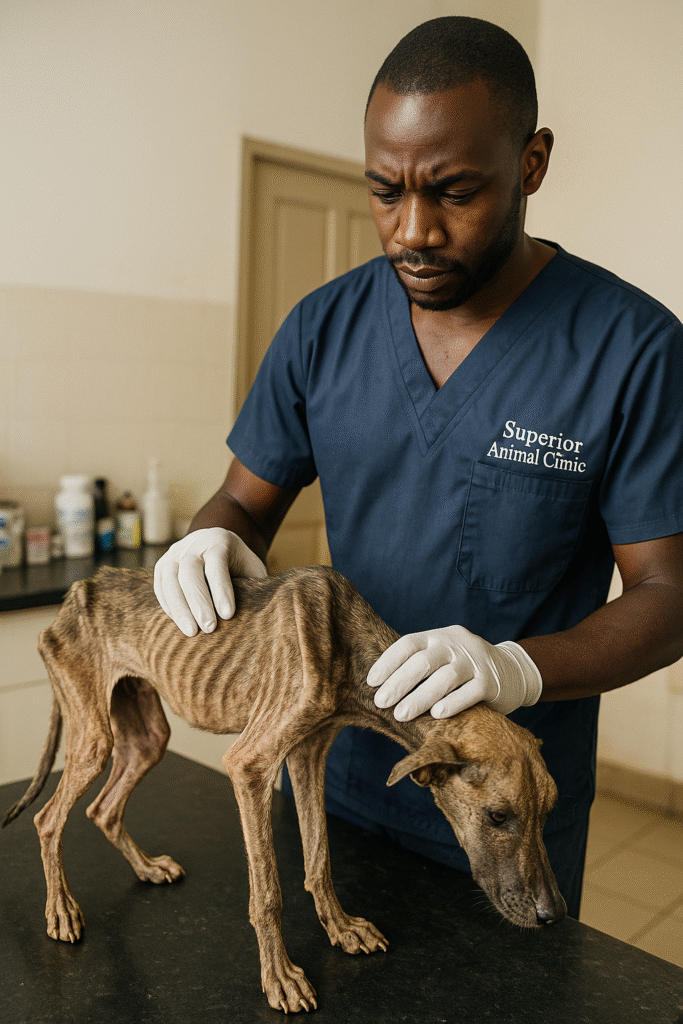
27. What home care tips help dogs recovering from liver disease?
Provide a calm environment, clean water, small meals, and follow vet prescriptions strictly.
Avoid giving over-the-counter medicine without consulting Superior Animal Clinic.
28. Can I use traditional herbs to treat liver disease in dogs?
Some herbs like milk thistle or turmeric may help — but always consult a vet first to avoid dangerous side effects or dosage errors.
29. How long does it take for a dog to recover from liver disease?
Recovery time varies from 2 weeks to 3 months, depending on the cause and stage.
Our vets at Superior Animal Clinic provide a customized recovery plan and continuous support.
30. Why choose Superior Animal Clinic for liver disease treatment in dogs?
Because we are the leading veterinary clinic in Kampala for diagnosing and treating liver diseases — offering:
- Expert veterinarians
- Modern diagnostic tools
- Affordable, compassionate care
- 24/7 emergency support
Serving Ntinda, Makindye, Muyenga, Munyonyo, Lubowa, Rubaga, Nakawa, and all Kampala neighborhoods.
🌿 Conclusion
If your dog is showing any signs of liver trouble — don’t wait.
Bring your pet to Superior Animal Clinic in Makindye, Kampala for expert diagnosis, compassionate care, and effective treatment.
We proudly serve Ntinda, Old Kampala, Kasubi, Nsambya, Katwe, Zana, Nakasero, Makindye, Buziga, Munyonyo, Nakawa, Rubaga, Muyenga, Naguru, Bugolobi, Kabowa, Kabojja, Lugogo, Lubowa, Seguku, Ndejje, Kololo, Mutundwe, Bukoto, Bulindo, and Kulambiro.
Your dog deserves the best — and Superior Animal Clinic is here to help every step of the way. ❤️🐾

W88ggtntc, another one of these sites huh? I’ve seen a lot of these appear and disappear pretty quickly, so make sure to be careful here. If you want to try: w88ggtntc